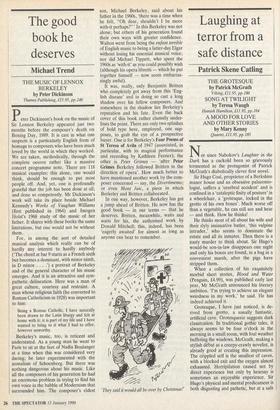The good book he deserves
Michael Trend
THE MUSIC OF LENNOX BERKELEY by Peter Dickinson Thames Publishing, £15.95, pp.240 Peter Dickinson's book on the music of Sir Lennox Berkeley appeared just two months before the composer's death on Boxing Day, 1989. It is cast in what one suspects is a particularly English form of homage to composers who have been much loved by the world in which they worked. We are taken, methodically, through the complete oeuvre rather like a massive concert programme note. There are 118 musical examples: this alone, one would think, should be enough to put most people off. And, yet, one is profoundly grateful that the job has been done at all; and done so competently. Mr Dickinson's work will take its place beside Michael Kennedy's Works of Vaughan Williams (first published in 1964) and Imogen Hoist's 1968 study of the music of her father. It shares with these books the same limitations, but one would not be without them.
For, in among the sort of detailed musical analysis which really can be of hardly any interest to hardly anybody (`The chord at bar 9 starts as a French sixth but becomes a dominant, with minor ninth, in D minor . . . .') a portrait of Berkeley and of the general character of his music emerges. And it is an attractive and sym- pathetic delineation. Here was a man of great culture, courtesy and restraint. A man whose religious faith (he converted to Roman Catholicism in 1928) was important to him: Being a Roman Catholic, I have naturally been drawn to the Latin liturgy and felt at home with it: it is part of my life and I have wanted to bring to it what I had to offer, however unworthy.
Berkeley's music, too, is reticent and understated. As a young man he went to Paris to sit at the feet of Nadia Boulanger at a time when this was considered very daring; he later experimented with the atonalism of Schoenberg. But there was nothing dangerous about his music. Like all the composers of his generation he had an enormous problem in trying to find his own voice in the babble of Modernism that surrounded him. The composer's eldest son, Michael Berkeley, said about his father in the 1960s, 'there was a time when he felt, "Oh dear, shouldn't I be more with-it perhaps?"' In this Berkeley was not alone; but others of his generation found their own ways with greater confidence. Walton went from being the enfant terrible of English music to being a latter-day Elgar without losing his essential musical voice; nor did Michael Tippett, who spent the 1960s as `with-it' as you could possibly wish (although his opera libretti — which he put together himself now seem embarras- singly awful).
It was, really, only Benjamin Britten who completely got away from this 'Eng- lish disease' and in doing so cast a long shadow over his fellow composers. And somewhere in the shadow lies Berkeley's reputation and his fate. Even the back cover of this book rather clumsily under- lines the point. There are only two splashes of bold type here, employed, one sup- poses, to grab the eye of a prospective buyer. One is for Berkeley's Four Poems of St Teresa of Avila of 1947 (associated, in particular, with its magical performance and recording by Kathleen Ferrier); the other is Peter Grimes — 'after Peter Grimes Berkeley followed Britten in the direction of opera'. How much better to have mentioned another work by the com- poser concerned — say, the Divertimento; or even Mont Juic, a piece in which Berkeley and Britten collaborated.
In one way, however, Berkeley has got a jump ahead of Britten. He now has the good book — in our terms — that he deserves. Britten, meanwhile, waits and waits for his, the authorised work by Donald Mitchell; this, indeed, has been `eagerly awaited' for almost as long as anyone can bear to remember.
`They said it would all be over by Christmas!'










































 Previous page
Previous page